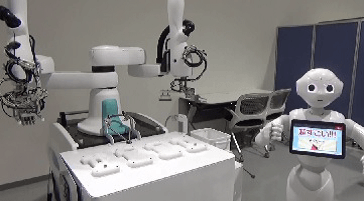Joint Proposals for Expanded Robot Applications: Cooperation between Kawasaki’s Dual-arm SCARA Robot duAro and SoftBank’s Humanoid Robot Pepper

Tokyo, February 7, 2017 — Kawasaki Heavy Industries, Ltd. announced today its start of joint efforts with SoftBank Corp. and SoftBank Robotics Corp. to propose new robot utilizations rooted in communication with human users in order to expand potential applications in a diverse range of fields. These efforts combine use of Kawasaki’s duAro, an industrial dual-arm SCARA robot designed to work and function together with humans, and SoftBank’s humanoid robot Pepper.
Japan’s working population is expected to continue decreasing at a rate of 720,000 persons per year, leading to major labor shortage problems. Industrial robots are being utilized to help human workers in an increasingly wide range of fields, but in order to achieve broader applications, they must be made easier to operate so that even inexperienced workers can use them without difficulty. The joint initiative will pursue developments that combine the strengths of duAro, a robot meant to take the place of workers in tasks that require both hands, and Pepper, a robot that excels in communication with humans, in order to facilitate easier adoption of industrial robots in factories, shops and offices that lack seasoned operators. For example, one potential usage is having Pepper engage in communication with human users and then respond to their instructions by operating duAro. Pepper also boasts excellent information communication capabilities, which can be used to analyze data such as duAro’s work status and convey it to human operators to enable remote monitoring and remote operation.
Representing the first joint proposal for such combined use of duAro’s and Pepper’s capabilities, a demonstration will be held during Pepper World 2017 (February 8–9, 2017 at Toranomon Hills Forum in Minato Ward, Tokyo). During the demonstration, human users will issue instructions to Pepper, in response to which Pepper will have duAro affix screen protectors to smartphones.
Additionally, SoftBank and SoftBank Robotics plan to begin in-house use of duAro, and Kawasaki in-house use of Pepper, in order to discover the best possible combined applications from a user’s perspective. These are part of efforts between the companies to strengthen their mutual ties.
In late February, Kawasaki plans to start using Pepper at Kawasaki Robostage in Odaiba, Tokyo to provide information in Japanese to domestic visitors as well as information in English and Chinese to overseas visitors. The Company also plans to stage an exhibition in which Pepper will launch duAro’s demonstration. SoftBank, on the other hand, intends to introduce duAro into operations on an experimental basis by having it install the large numbers of apps required on mobile devices before shipping them to corporate customers. Through automation of operations, SoftBank hopes to shorten delivery times and otherwise boost customer service levels while searching out new ways to effectively utilize duAro together with Pepper in various fields.
Moving forward, the companies plan to offer up new proposals for combined utilization of duAro and Pepper in order to facilitate more widespread introduction of robots in a variety of fields. Through these efforts, the companies hope to contribute toward the realization of a society and industries in which humans and robots live and work in harmony.